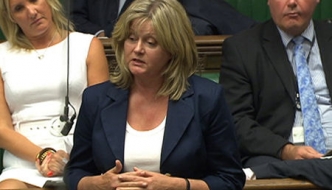National Referendum on the European Union debate
Anne Main supports the motion calling for a Bill to provide for a national referendum on the Europe Union.
Mrs Anne Main (St Albans) (Con): It is a delight to follow the right hon. Member for Belfast North (Mr Dodds), who made an impassioned speech. I am pleased that we were both named signatories to the motion, as that shows that there is cross-party support for this debate. I was, however, disappointed to hear my Prime Minister say in his statement before the debate that tonight’s vote will show the will of Parliament, as it clearly will not do so. It will show the will of the Whips; it will show the will of enforcement. It will certainly not show the will of the people, who have voted for us to be elected to Parliament to speak on their behalf. I am therefore saddened, as I would like Parliament to express the will of the people tonight.
My hon. Friend the Member for Gravesham (Mr Holloway) gave a fine speech, in which he pointed out that some people will say anything to get elected. If Members have been going around their constituencies and the country saying, “I’d like to have a referendum,” when they have the chance to have one they should be principled. I congratulate my hon. Friend on having taken the principled stance of resigning from his post over this. As he said, he spent seven years telling his constituents, “Given a chance, I would give you the opportunity of a referendum.”
It was with a degree of sadness that I dug out the Liberal Democrat leaflet— printed, boldly, in orange. It calls for a real referendum on Europe, and many Members have referred to it. It was printed only a very few months ago, and just before a general election, and I am sure people were giving them out in their thousands. Many people ask what the defining difference is between us and the Liberal Democrats, and perhaps this leaflet helps to answer that. It carries the name of the current Deputy Prime Minister, and a photograph of his face is printed on it, and this is what it says:
“It’s been over THIRTY YEARS since the British people last had a vote on Britain’s membership of the European Union. That’s why the Liberal Democrats want a real referendum on Europe. Only a real referendum on Britain’s membership of the EU will let the people decide our country’s future. But Labour don’t want the people to have their say…The Conservatives only support a limited referendum, on the Lisbon Treaty. Why won’t they give the people a say in a real referendum? Not everything is perfect in Europe, but we”—
the Liberal Democrats—
“believe our membership has been good for the country. In Europe we can get real action to tackle climate change…That’s why the Liberal Democrats will campaign to stay in Europe in the referendum. But whether you agree with Europe or not, it is vital that you and the British people have a say in a real EU referendum.”
The right hon. Member for Leicester East (Keith Vaz) takes a principled position in arguing exactly the same point. He is in favour of the EU, and he could make that argument in a referendum campaign. Moreover, we are not debating nuances tonight.
Mr Redwood: As my hon. Friend noted, when the Liberal Democrats were in opposition they read opinion polls to choose popular policies, but now that they are in government they read opinion polls to choose the most unpopular policies possible. Some 80% of the public do not want a three-line Whip, so they impose one; 67% of the public want a referendum, so they are now against that.
Mrs Main: Well—
Martin Horwood rose—
Mrs Main: I shall not give way to Liberal Democrat Members, as they can speak for themselves when they make their speeches. They can explain why, throughout a general election period, they gave out thousands of leaflets promising a real in/out referendum in which they would be prepared to defend their principled stand of wanting to stay in Europe.
I was surprised that the hon. Member for Bolton North East (Mr Crausby) lost the plot by getting hung up on the wording. My hon. Friend the Member for Bury North (Mr Nuttall), who proposed the motion, has got it absolutely right, and I hope the hon. Gentleman reconsiders his position.
The argument tonight is not about the wording; it is about whether or not we give the hundreds of thousands of people who want an opportunity to discuss this issue the chance to do so. Whichever side of the argument people fall on, and whatever the answer may be, we should not be frightened of simply giving them the chance to have that debate. That is what we are voting on. We are not voting on the wording. We are not voting on whether we should be in or out. We are voting on whether we want to give the British people a chance to hear the arguments in a reasoned way, rather than hear them as a result of a knee-jerk referendum called because Europe suddenly decides to do something we do not like. I would much rather that we have the chance, whichever side of the argument we fall on, to go out to make the case in a reasoned way. I would rather the wording be carefully crafted in a Public Bill Committee, not cobbled together because Europe suddenly does something we do not like and we say, “Oops, it’s a treaty change. Oops, we need to have a quick referendum.”
Let us do this at our pace. Let us not be frightened of the answer. I do not know what the answer will be. It might be one that I do not like, but I am prepared to live with it. I, too, have never voted on whether or not we should have joined the Common Market, as my mother would have called it, but I know from talking to people that they feel strongly that it is now time to talk about this matter, because we are dealing with something completely different. I am sick of hearing the word “referendum” touted around when it is popular with the voters and then seeing it kicked into the long grass when it falls into the “too difficult” box. This is not the “too difficult” box.
Martin Horwood rose—
Mrs Main: I am not going to give way to my colleague from the Liberal Democrats, because their speakers can defend themselves tonight. This motion is not in the “too difficult” box, and I am sure that there will be Liberal Democrats who search their conscience and decide to walk through the Lobby with us on a principled motion to give the people the right to have their say.
Martin Horwood rose—
Mrs Main: I will give way if the hon. Gentleman is going to explain the Liberal Democrat position.
Martin Horwood: I have explained our position, but I want to ask the hon. Lady about hers. When the Liberal Democrats, at the time of a fundamental shift in the relationship during the course of the Lisbon treaty, actually proposed an in/out referendum, she voted against it. Why was that?
Mrs Main: I ask the hon. Gentleman to join us tonight to say, “This is now what we should be doing.” He may just throw brickbats and not consider what the Liberal Democrats promised the people, but he has a chance to renew that promise tonight. We have a chance tonight to engage with what the people are asking us to engage in. Our leader promised us that we would have a chance to vote on the Lisbon treaty and we voted accordingly, but we did not have it. We have a new chance now.
This motion is not about reliving history, but it is about looking at how we have engaged with the voters over the past few years. My hon. Friend the Member for Gravesham has got it absolutely right: we have to be principled. For those who have maintained a principled plea to be given the chance, tonight is that chance. If the wording is not quite as some people would like, they should not worry because there will be a chance to craft it in Committee. Hon. Members should not feel that unless they can agree with every little word in the motion they cannot go through the Lobby with us. The wording is only suggested; the principal thing we are voting on tonight is whether we are going to listen to the people and say, “Let’s engage in this argument.” Let us not just park it in the “too difficult” grass, with promises of referendums tomorrow, because they may never come; and if they do come, they may come at a very inappropriate time to make the argument with the British people.
EARLIER INTERVENTION IN THE SAME DEBATE
Mrs Anne Main (St Albans) (Con): My hon. Friend is absolutely right. Here it is in black and white—it was in orange. This is exactly what the Liberal Democrats wanted to give the people and I am surprised that they are not honouring it today.
Mr Nuttall: The situation we find ourselves in is rather like that of someone who has boarded a slow train going in one direction and finds, just as they are settling in, that the train starts to career off at high speed in a completely different direction, with carriages being added on left, right and centre, and they are locked in and have no way of getting off. Worse still, the longer people are on the train, the more the fare goes up, but there is absolutely nothing they can do about it because any negotiation with the guards or the driver is almost impossible. This motion would simply allow the train to stop for a while so that the passengers can decide whether they want to continue the journey or even disembark.

DISSOLUTION OF PARLIAMENT
Watch: Anne Main, chair of the All Party Parliamentary Group on Bangladesh, talks about the Rohingya crisis and urges support for @DECappeal pic.twitter.com/FFL0lq8O0A
— DFID (@DFID_UK) October 12, 2017

